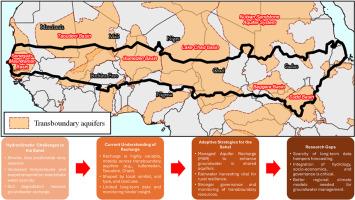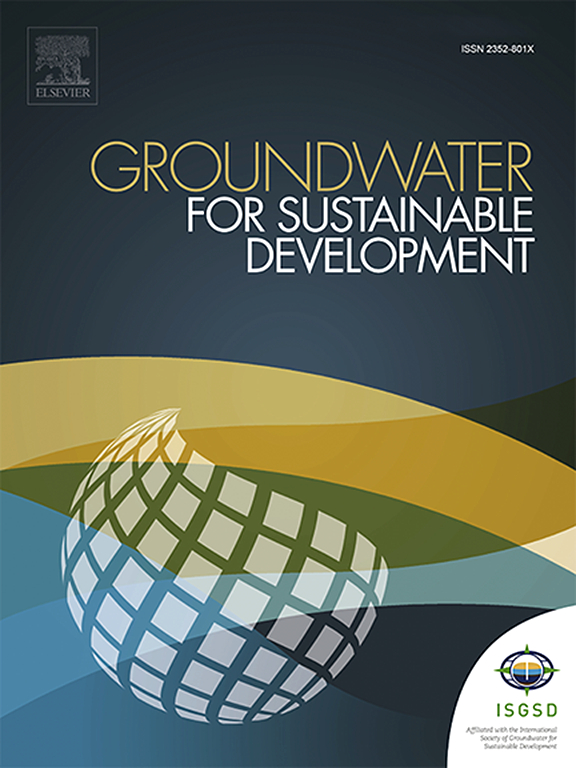地下水补给面临的威胁日益增加:气候变化下萨赫勒地区的适应性战略
IF 4.9
Q2 ENGINEERING, ENVIRONMENTAL
引用次数: 0
摘要
地下水补给是干旱和半干旱地区水安全的基本支柱,特别是在气候变化正在推动深刻水文变化的萨赫勒地区。这篇综述批判性地综合了目前关于气候变率与地下水补给动态之间相互作用的知识,解决了以下研究问题:不同的气候和人为因素如何影响萨赫勒地区的地下水补给,以及哪些策略可以增强恢复力?该综述强调了降水变化、气温上升和蒸散速率增加的影响。观测到的趋势表明,雨季缩短、降雨间断性增加和气温上升是加剧地下水压力的主要驱动因素。相比之下,土地利用变化和水治理结构也会影响补给模式,但影响程度较小。这些气候和人为变化使补给过程更具偶然性和空间异质性,使可持续地下水管理复杂化。预测表明,这些趋势将继续下去,进一步紧张地下水资源。该综述考察了局部因素,如土地利用变化、土壤特征和治理框架,在调节补给变率方面的作用。通过区域案例研究,它突出了数据稀缺环境中的挑战以及对更精细的气候水文模型的需求。为了应对这些新出现的威胁,本综述探讨了适应性策略,包括管理含水层补给(MAR)、雨水收集和先进的水利技术创新。还讨论了治理和政策框架的关键作用,重点是跨界合作、综合水资源管理和地方知情决策。尽管取得了这些进展,但仍存在重大的研究空白,特别是在长期地下水监测、预测气候建模和跨学科方法方面。通过弥合这些差距,本综述为萨赫勒地区适应性地下水管理提供了科学基础,为确保世界上最脆弱地区之一的长期水安全和恢复力提供了至关重要的见解。本文章由计算机程序翻译,如有差异,请以英文原文为准。

Rising threats to groundwater recharge: Adaptive strategies for the Sahel under climate change
Groundwater recharge is a fundamental pillar of water security in arid and semi-arid regions, particularly in the Sahel, where climate change is driving profound hydrological shifts. This review critically synthesizes current knowledge on the interplay between climate variability and groundwater recharge dynamics, addressing the following research question: How do different climate and human-induced factors impact groundwater recharge in the Sahel, and what strategies can enhance resilience?
The review emphasizes the impacts of shifting precipitation regimes, rising temperatures, and increasing evapotranspiration rates. Observed trends indicate a contraction of rainy seasons, greater rainfall intermittency, and rising temperatures, key drivers that exacerbate groundwater stress. Comparatively, land use changes and water governance structures also influence recharge patterns, but to a lesser extent. These climate and anthropogenic shifts have made recharge processes more episodic and spatially heterogeneous, complicating sustainable groundwater management.
Projections suggest these trends will continue, further straining groundwater resources. The review examines the role of localized factors, such as land use changes, soil characteristics, and governance frameworks, in modulating recharge variability. Through regional case studies, it highlights challenges in data-scarce environments and the need for more refined climate-hydrology models.
To address these emerging threats, the review explores adaptive strategies, including Managed Aquifer Recharge (MAR), rainwater harvesting, and advanced hydro-technological innovations. The critical role of governance and policy frameworks is also discussed, with an emphasis on transboundary cooperation, integrated water management, and locally informed decision-making. Despite these advancements, significant research gaps remain, particularly in long-term groundwater monitoring, predictive climate modeling, and interdisciplinary approaches.
By bridging these gaps, this review provides a scientific foundation for adaptive groundwater management in the Sahel, offering insights essential for ensuring long-term water security and resilience in one of the world's most vulnerable regions.
求助全文
通过发布文献求助,成功后即可免费获取论文全文。
去求助
来源期刊

Groundwater for Sustainable Development
Social Sciences-Geography, Planning and Development
CiteScore
11.50
自引率
10.20%
发文量
152
期刊介绍:
Groundwater for Sustainable Development is directed to different stakeholders and professionals, including government and non-governmental organizations, international funding agencies, universities, public water institutions, public health and other public/private sector professionals, and other relevant institutions. It is aimed at professionals, academics and students in the fields of disciplines such as: groundwater and its connection to surface hydrology and environment, soil sciences, engineering, ecology, microbiology, atmospheric sciences, analytical chemistry, hydro-engineering, water technology, environmental ethics, economics, public health, policy, as well as social sciences, legal disciplines, or any other area connected with water issues. The objectives of this journal are to facilitate: • The improvement of effective and sustainable management of water resources across the globe. • The improvement of human access to groundwater resources in adequate quantity and good quality. • The meeting of the increasing demand for drinking and irrigation water needed for food security to contribute to a social and economically sound human development. • The creation of a global inter- and multidisciplinary platform and forum to improve our understanding of groundwater resources and to advocate their effective and sustainable management and protection against contamination. • Interdisciplinary information exchange and to stimulate scientific research in the fields of groundwater related sciences and social and health sciences required to achieve the United Nations Millennium Development Goals for sustainable development.
 求助内容:
求助内容: 应助结果提醒方式:
应助结果提醒方式:


